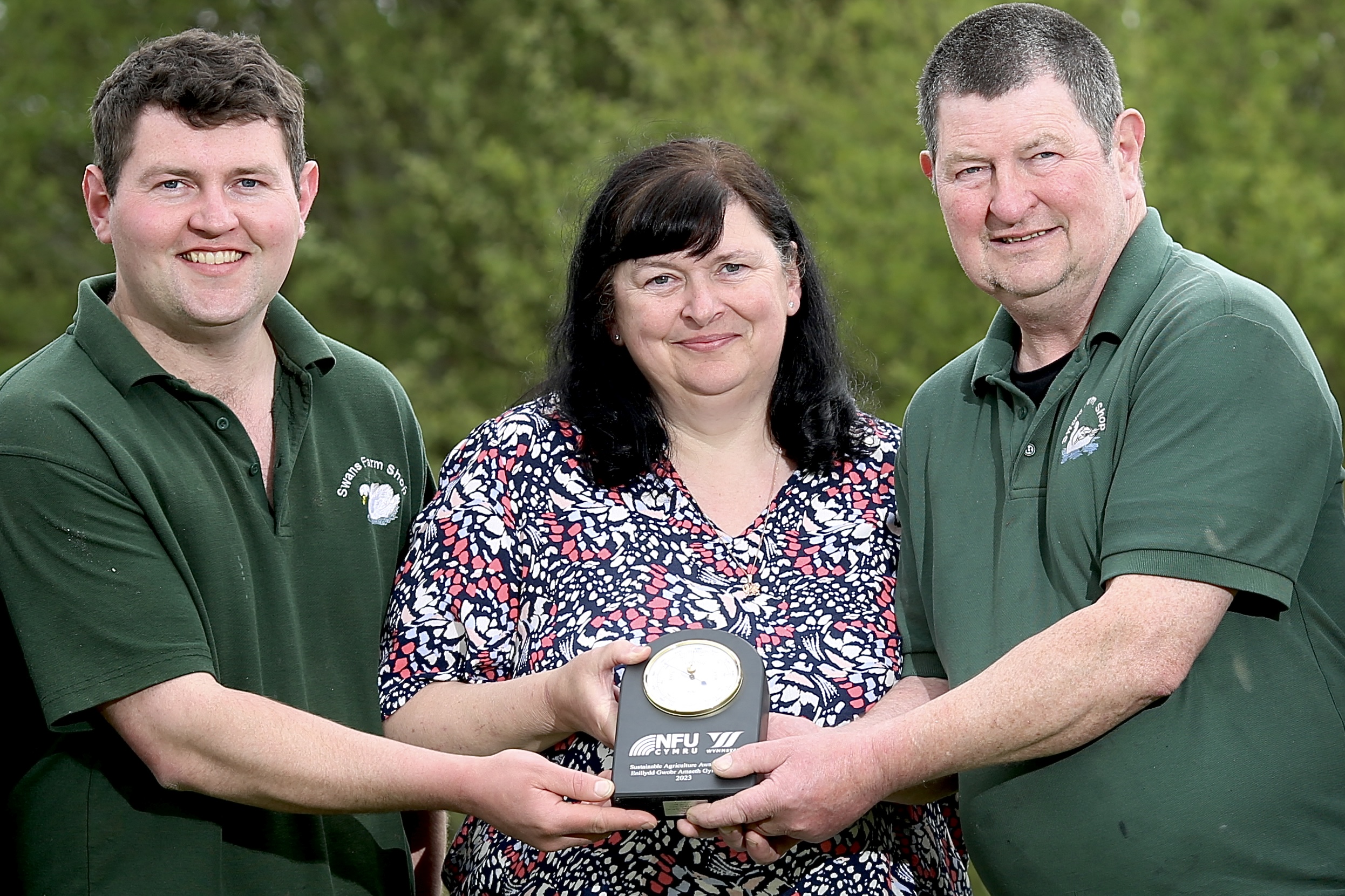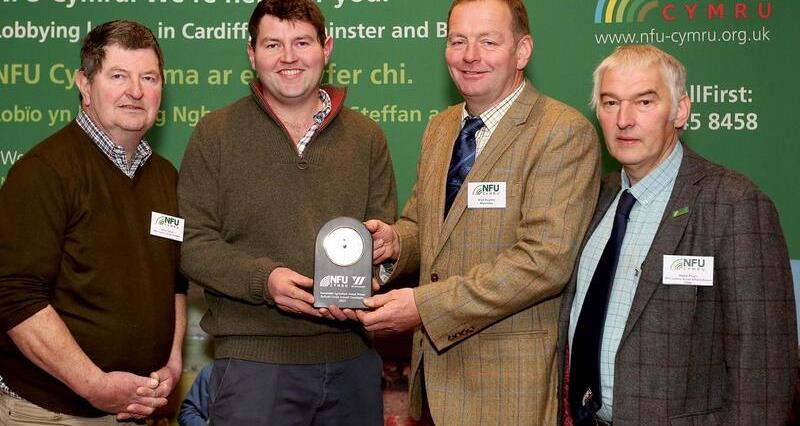It is not often that farm shop customers are seen pushing a trolley from shelf to shelf, brimming with the meat, fresh produce and other groceries that will feed them and their families in the week ahead.
The archetypal image of a farm shop as a place where shoppers might go to do a ‘basket shop’ to top up their weekly supermarket haul with meats, cheeses and some treats is one that rural retailers like the Swan family are changing.
Many of their own customers will do their weekly trolley shop at Ffrith Farm, the 250-acre holding where the Swans have farmed since the 1980s and where they established a farm shop in 2003.
History of the farm
Clive Swan’s parents had been farming 60 acres at Sealand, Chester, before moving across the border to set up a dairy herd at Ffrith Farm.
A decade later, after a devastating fire destroyed their milking parlour, they exited dairying to focus on beef production.
That has remained the core farming enterprise, for Clive, who now farms with his wife, Gail, and their son, Ed.
Two-week-old Aberdeen Angus dairy-cross calves are sourced from a local farm and taken through to finishing.
What has changed though is how that meat is sold.
Selling direct to the public
Selling direct to the public seemed a better alternative to supplying a processor so a farm shop was built.
It was an immediate success with the family quickly realising that a small length of counter space could generate more profit than a large block of land.
Ffrith Farm and local farmers and suppliers produce most of the products sold in the shop.
The Swans have created a sustainable business that is not reliant on government payments.

Beef marbling
One of the big selling points for their beef is marbling, with the secret to that in the feeding regime.
Although cattle are produced on a largely forage-based diet, there are other ingredients in the ration to achieve high marbling scores, as Ed explains: “We like the calves to come to us at a young age because the diet for marbling starts early.
“We have a special ration to get the marbling to fat ratio, we keep our cards close to our chest on what goes into that, but it works really well."
The cattle are slaughtered at an abattoir in Wrexham and whole carcasses are returned to be broken up in the on-farm butchery at Ffrith.
Some of the feed that goes into the diet is home-grown spring barley, and wheat is grown for the pig herd.
The pig herd
The mostly outdoor-bred progeny from 10 Welsh Pig sows also supply meat for the shop.
It is a breed the Swans have been loyal to since they went into pig production. “They are a really good pig, not too extreme, they produce rectangular slabs of white muscle with good eating quality," says Ed.
Free range hens and horticulture
There is a flock of free range hens too to produce eggs for the shop.
Ed’s resolve to make the family farm even more self-sufficient was also the catalyst to a highly successful horticulture diversification.
When he returned to the farm, there was a need for three people to make a living from it and that meant further diversification was required.
“We didn’t want to go down the route of economies of scale, chasing high-value land, but to make what we already had earn more," he recalls.
His unintentional inclusion of a high percentage of sunflower seeds in a herbal ley mix for grazing cattle in 2021 sparked one idea for how he might achieve that.
“It was a happy mistake," admits Ed, who established a pick-your-own (PYO) business. “PYO made sense because it tied in with everything else we had here.’’
Three acres were planted with sunflowers and thousands of flowers have been sold in the intervening two growing seasons.
The enterprise fills a summer dip in business in the farm shop when many of their regular customers are away on holiday.

Pumpkin PYO
To bolster income in late autumn, when sales can also tail off before the busy Christmas period, the farm was also perfectly placed to offer PYO pumpkins for Halloween, an initiative supported by Farming Connect.
An area of land below the shop, previously wasteland, was drained and earmarked as the pumpkin patch.
Ed bought 4,000 pumpkins seeds and commissioned a local nursery to grow them on to plugs.
“We are 700 feet above sea level on heavy clay, I didn’t rate our chances of sowing the seed directly," he says.
That approach yielded a 90% success rate after planting out, with potash applied at 200kg/acre.
The business invested £200 in a fleet of 14 wheelbarrows for customers to collect their pumpkins.
Ed takes charge of the weed management. “I mostly do it in the evenings, we don’t need to get extra help in for that so there isn’t a real cost to it."
When the crop is ready to be picked, customers come in their hordes, paying from £2 - £8 for a pumpkin, with many buying several.
In setting the price point, Ed struck a balance between being competitive and making a profit. “As farmers I think we often struggle with recognising the value of what we are producing," he suggests.
Traffic – and people – management is another consideration he will take forward in his future plans for the venture.
“Pumpkin and sunflower pickers stay a long time,’’ he says. “Our farm shop customers might park for 15 minutes but when people come to pick they can be here for two hours. The car park can be full all the time.’’

Future projects
With that in mind, car parking facilities may be extended and a café opened in the future.
“We haven’t built the café yet because we are so busy from day-to-day on the coal face, we haven’t had the time for projects which can be frustrating.’’
The income from the PYO business has added to farm profitability, and that gives Ed confidence as he looks ahead to the eventual removal of the Basic Payment Scheme (BPS).
Although the Sustainable Farming Scheme (SFS) is heavily weighted towards environmental goods, he believes farmers shouldn’t need a financial incentive to work with the environment.
Of the many measures he has in place to support wildlife and biodiversity is leaving his sunflower crop in situ over winter, as feed for birds.
“It is our environment as much as anyone’s, I don’t think we should expect to be paid to look after it. It shouldn’t be the only reason why we are making progress," says Ed.
No plastic use
That philosophy applies to the shop too, where no plastic is used.
Plastic trays have been replaced with starch-based alternatives, plastic bags with paper, and customers are encouraged to bring their own containers.
A 20kW solar panel system on the roof of the shop generates half its energy requirements.
'Swan Assured' guarantee
The family has also taken matters into their own hands on assuring standards within their food production, opting out of Red Tractor to create their own ‘Swan Assured’ guarantee.
The three green ticks that appear on their swan logo represent taste, reduced carbon and reduced plastic.
The reduced carbon assurance comes from regenerative farming practices – rotational grazing, reduced tillage, measures that have been shown to actively improve soil.
Awards
Sustainability is at the heart of the business and a reason why the Swans won the NFU Cymru/Wynnstay Group PLC Sustainable Agriculture Award in 2023, an accolade that recognises a commitment to the economic, environmental, social and cultural wellbeing of Wales.
They picked up two other awards in 2023 too - Farm to Fork Producer of the Year in the Food and Drink Wales Awards and the Butcher’s Shop of the Year Sustainability Initiative award.
“Sustainability is incredibly important to us,’’ says Ed.
“As a country we produce some of the most sustainable food in the world but we need to get even better at it because of the changing climate.
“Whether you believe in climate change or not, it is getting harder and harder to farm because of the weather, we have to grasp the issues that come with that and farm more sustainably to meet that challenge.
“For us it is also about reducing the number of lorries that come to the farm by producing as much as we can. If you can produce your own energy and feed on the farm, not rely on buying inputs, we see that as a business model that is sustainable for the long term."

